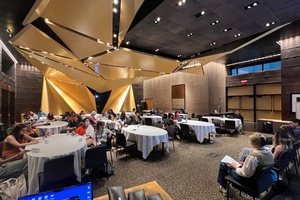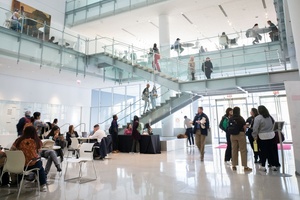Features:
Aim to Misbehave: Allies and Privileges in Media Creation
Facing how we fit into systems of oppression, finding space to dream

In our SRCCON 2017 session. (Erik Westra)
[You can also read this article in Spanish.]
During the Internet Freedom Festival at the beginning of 2017, Gabriela started running a version of the workshop that Valerie Aurora of the Ada Initiative gives at technology companies across California. It aims to bring awareness about the concept of allyship and the journey of discovering privileges in our own lives. We adapted this workshop for SRCCON 2017 to look at the work being done in journalism.
Traditional media coverage plays a big part in the system of oppressions that we live in, perpetuating stereotypes, myths and erasure via our current “standard operating procedure.” We believe that we can work on fighting oppression, uncovering and naming our privileges and biases not just in our personal work but our professional work, too.
Laying the Groundwork
The core idea is listening to the communities we report on and forcing ourselves to also think of them as communities we report to.The language we use about them must be language that they are okay with outsiders using about them. The concept of our relationships with communities must include the history that communities have with our platforms and profession. Active allyship involves doing work before you begin reporting and after you’ve written your story. It requires acknowledging how history acts upon every single interaction and how our work will add to that history.
One of the core battles is the “paradox of tolerance” which manifests itself in journalism as false objectivity. “Both sides” has consistently flattened the nuance and facets of stories and endangered the marginalized by giving decontextualized ahistorical platforms to hate and intolerance. These platforms are neither challenged nor put into the real context of historical or global oppression.
Active allyship requires that oppression be examined not as chasing the singular narrative or hook of a story but grounding that story in the material realities of what makes a story a story. Part of that is changing the role of the journalist from singular expert to dedicated worker. You will make a mistake, you will be accountable for your mistakes, and you will move on to be better. “Fe de Erratas” is a powerful tool in media—one that makes all of us more human and helps to build trust with our readers.
The Experience of Allyship
A very important part of our workshop was keeping it closed and anonymized. A constant barrier to ally journalism is the realities of the system it works in. Being one of only a handful of journalists who consistently advocates for better practices can damage your career, and if you yourself are a member of the marginalized group, it can damage your emotional and mental well-being. It was important to give those who are silenced—sometimes two and three times over—a space to deconstruct the process of doing this kind of journalism, and think about the toll it could take on themselves and on their own relationships with a community.
Again and again, participants spoke of trying to tell someone “this is a bad and insensitive idea” while being ignored, and then having to answer for that poor decision to a justifiably upset community.
A repeated example was the coverage of police violence, where black victims were constantly demonized, police accounts given preferential phrasing, and the connection between the incidents and the historical violence against black people in the United States given maybe a paragraph, at best. That decontextualization leads to protest coverage that continually marginalizes black political activity as unrest rather than framing it as a valid tactic in the face of continual violence.
Media that is actively acting in solidarity must not only shift that narrative but understand the weight of such an imbalanced relationship and the time it will take to fix. Unfortunately, too many platforms think that work is instantaneous, rather than commensurate with the time it took to break those relationships.
Our Dreams, Our Duty
Here is where we looked at another aspect of our goals for this workshop, a place to dream of something better. So much of the work of justice is spent, justifiably, developing tactics and strategies to counter expected resistance—which often means that journalists are not allowed to dream. One of our requirements for this workshop was to allow journalists the space to dream of what better stories would look like.
On immigration, the narratives they envisioned presented a much more realistic, human and ultimately compelling story. One of the largest hurdles to dismantling oppression is the misrepresentation of scale. Stories focus on singular immigrants, without fully bringing forth the full scale of what causes migration. People become vehicles rather than agents trying to navigate huge global change. One possibility mentioned by a workshop participant: looking at immigration through the lens of people going from Brazil to the US and the US to Brazil.
Allyship is often a buzzword, but it is grounded in necessary truth. Systems of the world have historically and continually interacted to marginalize and commit violence against people not in power. Tolerance and inclusion are not enough, and they are also not the truth. The truth is that we must work directly and concretely to present the reality of the world people live in—with not just our feelings, but our professional work. If we wish to make a better world, we have to find ways to be honest about the world; that is our work as journalists, and our duty as people.
Credits
-
 Sydette Harry
Sydette Harry
Sydette Harry is a child of Far Rockaway. She is a writer and communications critiquer, concerned with communities, sociality and technology, race, gender, and pop culture. Currently Editor of Network at Mozilla.
-
 Gabriela Rodríguez Berón
Gabriela Rodríguez Berón
Gabriela Rodríguez Berón grew up in Uruguay before moving to the US and has been a software engineer for almost 20 years. Gaba founded DATA, an open data non-profit in South America, was heavily involved at the Coral Project, building tools and guides to improve community spaces around journalism online. She is a member of the board of directors at Stumptown Syndicate, a non-profit that supports resilient, inclusive tech communities in Portland, Oregon, and facilitates the Internet Freedom Festival in Valencia, Spain. Gaba is a feminist, activist, and mom to two kids.



